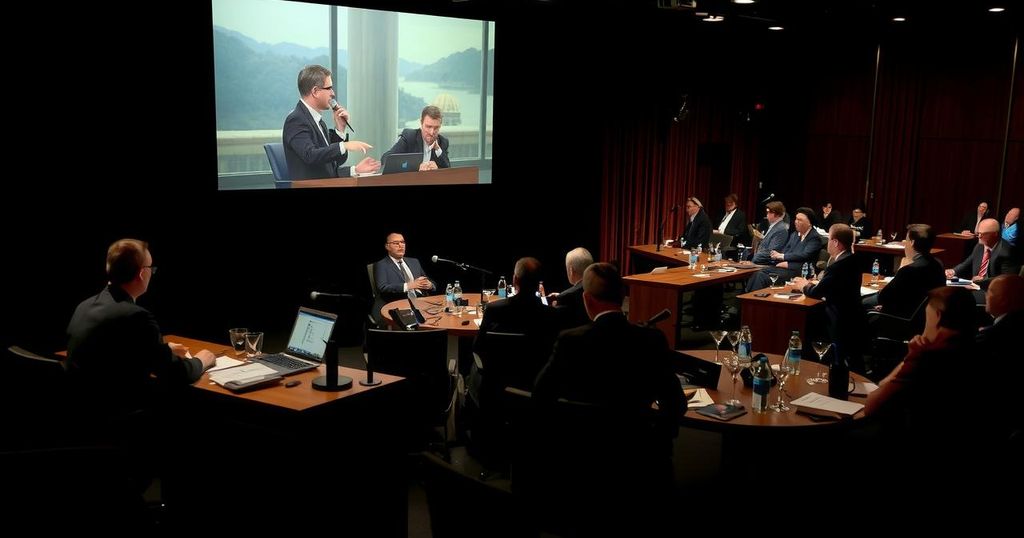At COP29 in Baku, Azerbaijan, countries expressed concern over a draft agreement that may retract previous commitments to phase out fossil fuels. Tensions arose between developed and developing nations, particularly regarding financial assistance for climate efforts. Prominent figures, including UN Secretary General Guterres, emphasized the need for ambition, while some nations criticized the draft as unbalanced. The discussions highlight the critical juncture at which climate action stands, with a strong focus on addressing the needs of vulnerable countries while pushing for reductions in fossil fuel dependency.
At the COP29 climate negotiations held in Baku, Azerbaijan, tensions have arisen as several leading nations expressed concerns that a draft agreement might undermine previous commitments to reduce fossil fuel dependence. UK Energy Minister Ed Milband emphasized that stagnation would be perceived as a retreat, stating, “Standing still is retreat, and the world will rightly judge us very harshly if this is the outcome.” The UK, European Union, New Zealand, and Ireland jointly criticized the proposed agreement as “unacceptable.”
Developing nations expressed dissatisfaction with the absence of a financial commitment to assist them in combating climate change. UN Secretary General Antonio Guterres reminded participants that “failure is not an option.” The ongoing discussions center around balancing financial support for developing countries with pledges to decrease fossil fuel usage.
While some developing nations and wealthy oil states are hesitant to pursue stringent policies on fossil fuels, fearing negative impacts on their economies, EU Commissioner for Climate Action Wopke Hoekstra condemned the draft deal as “unbalanced, unworkable, and unsubtle.” U.S. Climate Envoy John Podesta echoed similar frustrations, commenting on how the draft reflects a lack of continuity from last year’s agreements in Dubai. He stated, “We will have failed in our duty and the millions of people already feeling the effects of extreme weather.”
Samoan Minister Cedric Schuster, representing vulnerable island nations, urged respect for the momentum built the previous year, stating, “We cannot afford to undermine the progress achieved less than a year ago in Dubai.” At COP28, nations had pledged to transition away from fossil fuels, and Ireland’s Minister for the Environment Eamon Ryan emphasized the necessity for ambitious mitigation measures to avoid collective failure.
The attitudes of the COP29 host, Azerbaijan, have drawn criticism for seemingly aligning with fossil fuel interests. Minister Ryan remarked on the backsliding regarding previous commitments, likening the new text to a menu of options rather than a binding agreement. The G77+China group representing developing nations called for $1.3 trillion by 2030, seeking clarity on sources of funding for the transition away from fossil fuels, which they believe should include grants rather than loans that exacerbate their debt problems.
Diego Pacheco, Bolivia’s chief negotiator, expressed frustration at the proposal’s shortcomings, labeling them as inadequate. He stated, “This is an offence to the demands of the global South,” signaling the need for genuine financial commitments at these talks.
As discussions continue, it remains critical to ensure that promises from wealthier nations translate into actionable support for those most affected by climate change.
The COP29 climate conference is a pivotal moment for nearly 200 countries to address the global response to climate change, especially focusing on fossil fuel consumption. This conference follows significant breakthroughs, such as the COP28 resolution to transition away from fossil fuels, and representatives are concerned about potential regression. Financial assistance for developing and vulnerable nations has been a recurring theme in climate discussions, particularly since significant commitments made in the Paris Agreement of 2015. The current atmosphere at COP29 reflects heightened tensions among developed and developing nations as they navigate complex economic and environmental challenges while striving for a collective solution against climate change.
In conclusion, the tensions at COP29 underscore the challenges that lie in reconciling financial commitments from developed nations with the urgent need to reduce fossil fuel consumption. Countries like the UK and the European Union have voiced strong concerns about regressive measures that may emerge from the negotiations, while developing nations continue to seek clarity and support for their transition away from fossil fuels. The upcoming days will be critical in determining whether countries can find common ground and ultimately secure both financial and environmental commitments necessary to combat climate change effectively.
Original Source: www.bbc.com






